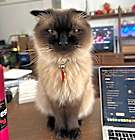Color
Brown or Chocolate (Mostly)
Size
(when grown) -
Details
Not good with kids
Not good with dogs
Not good with cats
Spayed or Neutered
Shots are up-to-date
Story
Hi! My name is Theo and I'm a 15 year old scottish fold rescued all the way from Kuwait. I'm settling beautifully in my new foster home. The rescue had me all checked out and I'm totally healthy. I am now available for adoption
I am a sweet boy that loves to be pet and get attention. I also really enjoy napping near you and spending time wherever you are. I'm a mellow guy, happy to just hang out and keep you company. I do okay with other cats so long as they leave me alone. I would say that I'm "tolerant". I would do great as an only cat too. I havent been around dogs to the best of the rescue's knowledge. I would do well with mellow, calm kids in a non chaotic home. A home where I can live out the rest of my senior years.
I am neutered, microchipped, vaccinated with my FVRCP and rabies. I am fecal tested negative for parasites, FIV/Felv negative, dewormed, and I've had a senior blood and urine panel that came back really good.
I am currently fostered in North Hollywood and you can apply directly at (www.friendsforliferescuenetwork.com/adopt-la) please be sure the link includes -la at the end or the app wont work.












